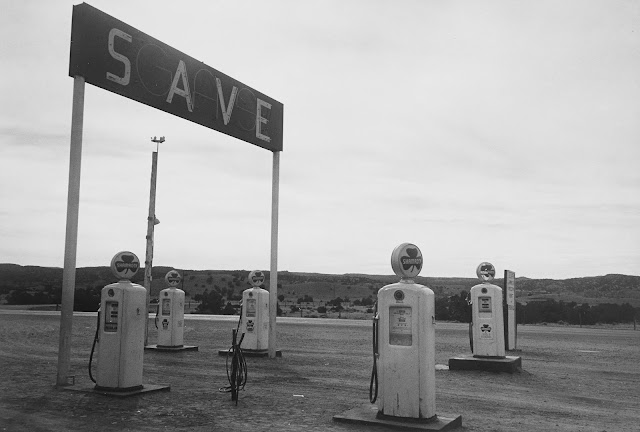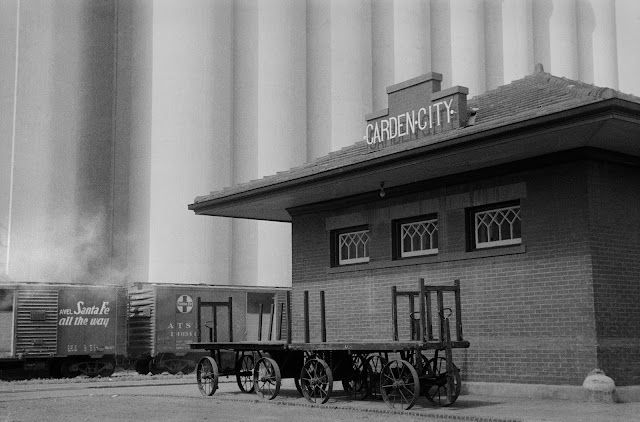Museum of Fine Arts, Houston
100 photographs chart the cross-country journeys of two photographers, who each captured singular views of America at mid-century
In April 1955, two photographers were awarded grants by the John Simon Guggenheim Foundation, both for U.S. survey projects. One was Robert Frank, whose cross-country trip by car would result in the celebrated book The Americans. The other was Todd Webb, who at the age of 49 was awarded the grant to walk, boat and bike across the United States in order to depict “vanishing Americana, and the way of life that is taking its place.” On view October 8, 2023, through January 7, 2024, the exhibition Robert Frank and Todd Webb: Across America, 1955 will bring these simultaneous projects together for the first time.
In 1955 Todd Webb was part of art photography’s inner circle. Between 1946 and 1966, his work was included in 14 exhibitions at the Museum of Modern Art alone. Robert Frank, in comparison, was the young upstart determined to make his mark, and he would go on to become one of the most influential photographers to date. These men, of different backgrounds and generations, embarked on cross-country journeys supported by Guggenheim Foundation funding. They chose different methods of travel, different photographic approaches and styles and were interested in different aspects of American culture. Knowing “‘the photographing of America’ is a large order,” they threw themselves into the impossible task anyway, eager to prove their artistry.
During their individual travels, both artists tended to capture images of bars, cowboys, crowds, odd architecture, parades, gravesites and trolleys. For both, a composition including the American flag was too potent to resist. While neither artist found the exact vision of America they expected, both men created photographs that mirrored their style and perspectives on American culture.
Frank’s shot-from-the-hip works captured movement with selected focus, his images conveying both stark reality and human compassion. The exhibition features both published and unpublished works from Frank’s The Americans. Webb’s never-before-seen images are characterized by their focused stillness; their precise exposure and careful compositions suggest a patient humanity.
“I am enormously pleased that the Museum of Fine Arts, Houston, will bring together both Robert Frank’s and Todd Webb’s landmark 1955 projects for the first time, in this exhibition. The opportunity to compare the work of these influential photographers conveys the magnitude of their undertaking, and the complexity of their individual perspectives on an often-idealized era in America,” said Gary Tinterow, Director and Margaret Alkek Williams Chair of the Museum of Fine Arts, Houston.
“It’s eye-opening to put these projects side-by-side for the first time,” noted exhibition organizer Lisa Volpe, MFAH Curator of Photography. “It reveals the humanity in Webb’s work, and the underrecognized, but profound hope in Frank’s photographs.”
Comparison of both Frank’s and Webb’s projects reveals more than any singular study could. The similarities clarify the context in which these projects were conceived and carried out. The differences highlight each artist’s approach and vision. More than 100 images—50 by each artist—illuminate Frank’s and Webb’s different perspectives and reveal the unvarnished state of American culture at mid-century.
About Robert Frank and Todd Webb
Over 60 years, Robert Frank (American, born Switzerland, 1924–2019) radicalized photography through his selection of subject matter and his rough, highly charged vision, expressing a personal viewpoint of the world. Frank emigrated from Switzerland to the United States in 1947 and briefly worked for top fashion magazines, including Harper’s Bazaar and Mademoiselle. He was the first European photographer to receive the prestigious Guggenheim Fellowship, which he used to travel the country’s highways, photographing postwar America.
Also see https://photoarthq.blogspot.com/2020/07/robert-frank.html
Todd Webb (American, 1905–2000) is noted for his endless curiosity and compassion, and his patient eye. Webb’s broad humanity was shaped by his life experience. A successful stockbroker in the 1920s, he lost all of his earnings in the Crash of 1929. During the Depression, Webb prospected for gold, worked as a forest ranger, wrote short stories and picked up a camera. His interest in and love for photography soon crowded out his other ambitions. After serving in World War II, Webb moved to New York to devote himself completely to photography.
MFAH Exhibition Catalogue
A fully illustrated catalogue accompanies the exhibition and includes the first-ever publication of Webb’s photographs from his 1955 journey, alongside Frank’s images. One essay analyzes these projects within the context of the American scene in 1955 and the trends in art photography at mid-century. Another by Susan Straight—whose books include Highwire Moon (2001), a finalist for the National Book Award, and Mecca (2022)—explores the personal resonance of these compelling photographs.
Organization and Funding
This exhibition is organized by the Museum of Fine Arts, Houston.
IMAGES














No comments:
Post a Comment